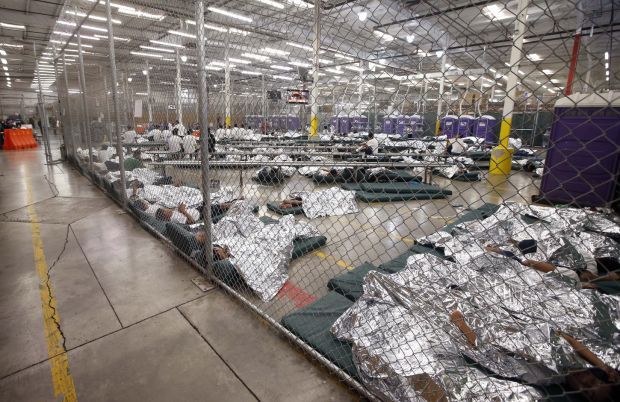PHOENIX — A federal judge on Friday ordered the Border Patrol to make immediate changes to how it treats people being held after being picked up for being in this country illegally.
U.S. District Court Judge David Bury said it is a violation of the rights of those being detained — often for days — to not provide them clean bedding, including a mat on which to sleep.
He also ordered the agency to deal with the personal hygiene needs of detainees being held for longer than 12 hours, including the ability to wash and clean themselves. Bury cited testimony from an expert who saw holding rooms with floors, walls, benches, drains, toilets, sinks, stalls and other fixtures, “all of which were badly soiled.”
And Bury said there is evidence the Border Patrol is not complying with standards that require one toilet for every 12 male prisoners and one for every eight female detainees. One large holding room at the Nogales station had a capacity of up to 88 — but with just one working toilet and one that didn’t flush at all.
In deciding to issue the injunction, Bury said some of the conditions cited by the American Civil Liberties Union and other groups representing detainees amount to a deprivation of their constitutional rights. And that, the judge said, “constitutes irreparable injury.”
What that means, Bury wrote, is that it takes more than simply allowing those affected to sue — after the fact — for financial compensation.
But the judge acknowledged that there may be legitimate security reasons for some of the conditions under which people are held, like the lights being on 24 hours a day. And he said there is some evidence the Border Patrol is working to improve conditions and meet its own standards.
So he specifically ordered the agency to monitor its own compliance for things like the availability of working sinks and toilets, cell temperatures, sanitation and the availability of personal hygiene items like toilet paper, toothbrushes, feminine hygiene items, baby food, diapers and meals.
In a prepared statement, Nora Preciado, an attorney for the National Immigration Law Center, called the order “a victory for the Constitution.”
“No one, regardless of where they were born, should be subject to the deplorable conditions our plaintiffs and other class members endured in the hieleras,” she said, using the Spanish word for “ice boxes” that migrants have used to describe the Border Patrol’s temporary holding facilities.
And Melissa Crow, legal director of the American Immigration Council, said Bury “properly rejected the agency’s excuses that it had done everything within its means to protect the health and safety of those in its custody.”
The lawsuit, filed in 2015 by immigrant-rights groups, contends that many people who are detained at facilities at Tucson, Nogales, Douglas and Casa Grande are subject to “inhumane and punitive conditions.”
It was filed on behalf of three people who attorneys said were denied food, adequate clothing and sleep. But the lawyers said the conditions they experienced are not unique and pursued the case as a class-action lawsuit.
They noted that the Border Patrol facilities are supposed to be just holding areas until people can be taken to more appropriate locations.
Bury cited evidence that in a 3½ month period in 2015, only about 3,000 of the approximately 17,000 detainees were processed within 12 hours. More than 8,600 were held for up to 23 hours; 6,800 for up to 48 hours; 1,200 for up to 71 hours; and 476 for 72 hours or more.
“They have been packed into overcrowded and filthy holding cells with the lights glaring day and night, stripped of outer layers of clothing and forced to suffer in brutally cold temperatures, deprived of beds, bedding and sleep, denied adequate food, water, medicine and medical care,” the lawsuit stated.
Bury’s ruling contains a mixed bag of findings.
For example, he said the lights need to be on at all times “where security cameras are not technologically capable of recording in dimmed light.” But the judge took exception to the Border Patrol serving the first meal of the day in pre-dawn hours.
“The court finds no security reason nor any reason related to the processing activities being conducted at these facilities to wake up detainees by scheduling one of the three burrito meals at 4 a.m.,” he wrote.
Bury also criticized the lack of mattresses, requiring people to sleep on “the cold concrete floors and benches in the holding cells.” But he was more willing to allow the Border Patrol to continue using Mylar sheets rather than blankets.
“The efficacy of the Mylar blanket depends on comfortable room temperatures being maintained at Border Patrol stations,” he wrote. And he said the agency reports holding cell temperatures at between 71 and 74 degrees.
The judge also expressed displeasure with some of the other practices.
For example, prior to 2015 there were no trash receptacles in holding cells, resulting in detainees putting used toilet paper on the floor because they come from countries where plumbing cannot tolerate flushing the paper and are used to putting it into trash receptacles. Border Patrol cited “safety reasons.” But Bury said that was “no excuse.”
The judge said he was also swayed into issuing his order because the people being held by Border Patrol are neither pretrial detainees nor prisoners.
“They are civil detainees who are being denied the ability to wash or clean themselves for several days,” he said. And Bury said that transferring them as a 72-hour limit approaches “does not solve the problem.”
Still, he acknowledged a lack of showers in these holding facilities. With that in mind, he ordered Border Patrol to “provide some means or materials for washing and/or maintaining personal hygiene when detainees are held longer than 12 hours.”




